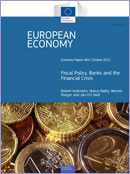|
|
|
|
|
|
 |
 |
 |
 |
Portugal’s sixth quarterly review concludes: economic programme broadly on track
Staff teams from the European Commission (EC), European Central Bank (ECB), and International Monetary Fund (IMF) visited Lisbon during November 12-19 for the sixth quarterly review of Portugal’s economic programme. They concluded that the programme is broadly on track, despite stronger headwinds. External and fiscal adjustment continues to advance, adequate capital and liquidity buffers have reduced financial stability risks, and structural reforms are proceeding apace. At the same time, rising unemployment, lower incomes, and uncertainty are weighing on confidence, while the recession in the euro area is beginning to dampen export dynamics. Nonetheless, GDP is expected to gradually turn positive in 2013 and grow by 0.8% in 2014. Approval of the conclusion of this review will allow the disbursement of EUR 2.5 billion (EUR 1.6 billion by the EU, and EUR 0.9 billion by the IMF). These disbursements could take place in January 2013 subject to the approval of the IMF Executive Board, ECOFIN and the Eurogroup.
|
 |
 |
 |
|
 |
 |
 |
 |
 |
|
 |
 |
 |
The reforms underway are laying the ground for sustainable growth and job creation and the Commission will continue to stand by Portugal as it sees these reforms through.
Olli Rehn, Vice-President of the European Commission for Economic and Monetary Affairs and the Euro |
 |
|
|
|
 |
 |
 |
 |
Eurosystem to introduce second series of euro banknotes – the “Europa” series
The European Central Bank (ECB) and the national central banks (NCBs) of the Eurosystem are to introduce a second series of euro banknotes. Announced on 8 November, the new “Europa” series notes will include enhanced security features and a portrait of Europa in the watermark and the hologram. Europa is a figure from Greek mythology and the origin of the name of the European continent. The new banknotes will be introduced gradually over several years, starting with the €5 banknote in May 2013. They will include three new security features: a portrait watermark, portrait hologram and emerald number. The new series of banknotes will be easy to distinguish from the first series and will have the same denominations as its predecessor. Banknotes from the first series will gradually be withdrawn and eventually cease to be legal tender, but they will retain their value indefinitely and it will be possible to exchange them at Eurosystem NCBs at any time. The "Europa" series €5 banknote will be unveiled in full on 10 January 2013.
|
 |
|
 |
 |
|
 |
 |
 |
 |
Euro area trade surplus in goods grows to EUR 9.8 billion
The euro area trade balance in goods with the rest of the world in September 2012 is estimated to have grown to a surplus of EUR 9.8 billion, compared with EUR +1.7 billion in September 2011. The data were released on 16 November by Eurostat, the statistical office of the European Union. The August 2012 balance was EUR +5.2 billion, compared with -5.9 billion in August 2011. In September 2012 compared with August 2012, seasonally adjusted exports fell by 1.1% and imports by 2.7%. The estimated September 2012 international trade balance in goods for the EU as a whole was a EUR 12.6 billion deficit, compared with a deficit of EUR 10.9 billion in September 2011. The August 2012 balance was EUR -13.2 billion, compared with -22.5 billion in August 2011.
|
 |
|
 |
 |
|
 |
 |
 |
 |
Women on Boards: Commission proposes 40% objective
The European Commission has proposed new legislation to accelerate progress towards a better gender balance on the corporate boards of European companies. The proposal adopted on 14 November sets a legally binding target of 40% by 2020 for the supervisory boards of publicly listed companies and by 2018 for state owned companies. Companies that have less than 40% of women the under-represented gender on their supervisory boards will have to give preference in their selection procedures to female candidates with qualifications equivalent to those of male candidates. Moreover, companies will be required to make appointments by applying gender-neutral and unambiguous criteria. The proposal is expected to apply to around 5 000 listed companies in the EU. It does not apply to small and medium-sized enterprises (SMEs) or non-listed companies. Currently, 85% of non-executive board members are men, while women make up a mere 15%.
|
 |
|
 |
 |
|
|
|
 |
 |
 |
 |
Fiscal Policy, Banks and the Financial Crisis. European Economy. Economic Papers. 464. October 2012.
This paper studies the effectiveness of euro area fiscal policy, during the recent financial crisis, using an estimated New Keynesian model with a bank. A key dimension of policy during the crisis was massive government support for banks, yet that dimension has so far received little attention in the macro literature. The authors use the estimated model to analyse the effects of bank asset losses, of government support for banks, and other fiscal stimulus measures. The results suggest that support for banks had a stabilising effect on output, consumption and investment in the euro area. While increased government purchases may have helped to stabilise output, however, they crowded out consumption. Higher transfers to households had a positive impact on private consumption, but a negligible effect on output and investment. Banking shocks and increased government spending explain half of the rise in the public debt/GDP ratio since the onset of the crisis.
|
|
 |
 |
|
|
|
|
|
|
|
|
|
|
|
 |
| Directorate-General for Economic and Financial Affairs |
 |